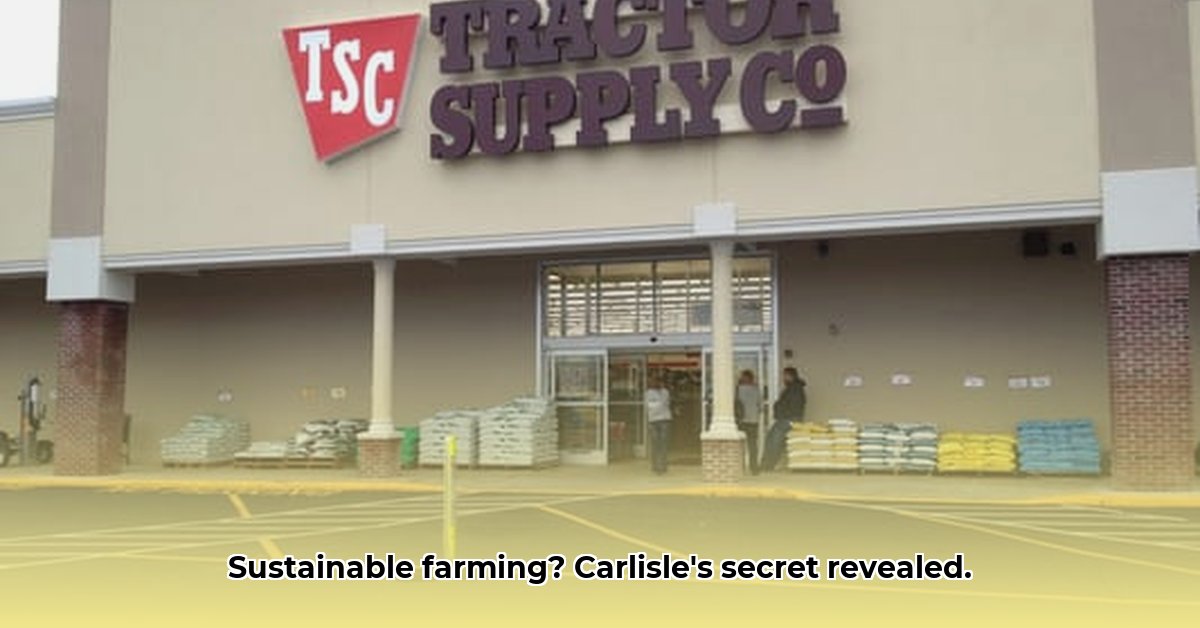
Carlisle Tractor Supply occupies a crucial position within Cumberland County, Pennsylvania's agricultural landscape. However, the extent of its contribution to sustainable farming practices requires further investigation. This analysis examines its current role, identifies key areas for improvement, and proposes actionable steps to enhance its support for environmentally conscious agriculture. For ideas on improving soil health, check out these raised garden beds.
Geographic Reach: A Rural Network
Carlisle Tractor Supply serves seven communities across Cumberland County, strategically located near major highways (I-81, PA-74, and PA-34). This accessibility is vital for farmers, improving operational efficiency. However, a comprehensive understanding necessitates a deeper dive into the demographics of each served community. Analyzing population size, predominant farming types (large-scale or family-owned), and agricultural density within each area is crucial for a complete assessment of Carlisle Tractor Supply's influence. A visual representation, such as a map displaying these variables, would provide valuable context. For example, understanding whether the store's accessibility equally benefits smaller, family-run farms versus larger commercial operations, or how its location impacts farmers in areas with varying population densities, is essential for evaluating its overall impact. This detailed analysis allows for a more nuanced understanding of how Carlisle Tractor Supply truly supports the entire agricultural community.
Sustainability Initiatives: A Data Gap
A significant limitation in assessing Carlisle Tractor Supply's contribution to sustainable agriculture stems from a lack of concrete data on specific sustainability initiatives. This deficiency hinders a complete evaluation of its environmental impact. Key questions remain unanswered: Does the store actively stock organic seeds or biopesticides? Does it provide educational resources on soil conservation? Are incentives offered to encourage farmers to adopt sustainable practices? While some experts believe that a proactive approach by the store could significantly shape local farming practices, others contend that market demand is the primary driver. Without comprehensive data, the extent of Carlisle Tractor Supply's role in promoting sustainable agriculture remains unclear. This lack of data also raises the critical question: How can farmers access and afford sustainable products and practices? Addressing this gap requires immediate attention.
Actionable Steps: Cultivating a Greener Future
To remedy this information gap and amplify Carlisle Tractor Supply's support for sustainable agriculture, the following steps are recommended:
Conduct a Comprehensive Sustainability Audit: A thorough audit encompassing supply chain analysis, energy consumption, waste management, and employee training on environmental stewardship will provide a baseline for improvement. This audit should be conducted by an independent, third-party organization for greater objectivity.
Expand Sustainable Product Offerings: Increasing the availability of organic seeds, biopesticides, water-efficient irrigation systems, and other eco-friendly farming tools directly addresses growing consumer and farmer demand for sustainably produced food. Collaborating with local suppliers of these products should also be explored. This expansion should also include analyzing the price competitiveness of these options to ensure affordability for farmers.
Foster Strategic Partnerships: Collaborations with local farmers, governmental agencies (such as the USDA), and environmental non-profits can yield multiple benefits. Joint workshops and educational programs can educate farmers on sustainable practices, while joint marketing initiatives can raise consumer awareness.
Implement Robust Data Collection: Systematically tracking sales of sustainable products and conducting customer surveys will provide invaluable insights into farmer preferences, needs, and perceptions of sustainable agriculture. This data will inform inventory management and product development.
Enhance Transparency and Reporting: Regular publication of sustainability progress reports will demonstrate commitment and encourage accountability. Transparent reporting, encompassing both successes and challenges, builds trust with customers and the community. This fosters continuous improvement and strengthens the store's credibility as a supporter of sustainable agriculture.
Risk Mitigation: Navigating Potential Challenges
Carlisle Tractor Supply, like any business, faces inherent risks. A proactive approach to risk management is crucial.
| Risk Factor | Likelihood | Impact | Mitigation Strategy |
|---|---|---|---|
| Regulatory Non-Compliance | Medium | High | Proactive audits, comprehensive employee training on environmental regulations, establishment of robust internal compliance protocols. |
| Limited Sustainable Product Availability | High | Medium | Aggressive expansion of product lines, active pursuit of partnerships with sustainable product suppliers, thorough market research to identify unmet farmer needs. |
| Reduced Customer Traffic | Low | Low | Targeted marketing campaigns emphasizing sustainable products and environmental stewardship, implementation of loyalty programs rewarding eco-conscious choices. |
| Supply Chain Disruptions | Low | High | Diversify suppliers, robust inventory management, exploring alternative transportation to minimize vulnerability to disruptions. |
Addressing these risks proactively will strengthen Carlisle Tractor Supply's position as a key partner in promoting sustainable agriculture.
Conclusion: A Path Towards Sustainable Growth
Carlisle Tractor Supply's potential contribution to sustainable agriculture is significant. However, realizing this potential requires a proactive, data-driven approach that addresses identified data gaps, fosters collaborations, and mitigates potential risks. By implementing the recommendations outlined, Carlisle Tractor Supply can solidify its role as a leader in supporting environmentally conscious farming practices within Cumberland County and beyond. The journey towards a truly sustainable agricultural future requires ongoing commitment, adaptation, and a willingness to embrace continuous improvement.